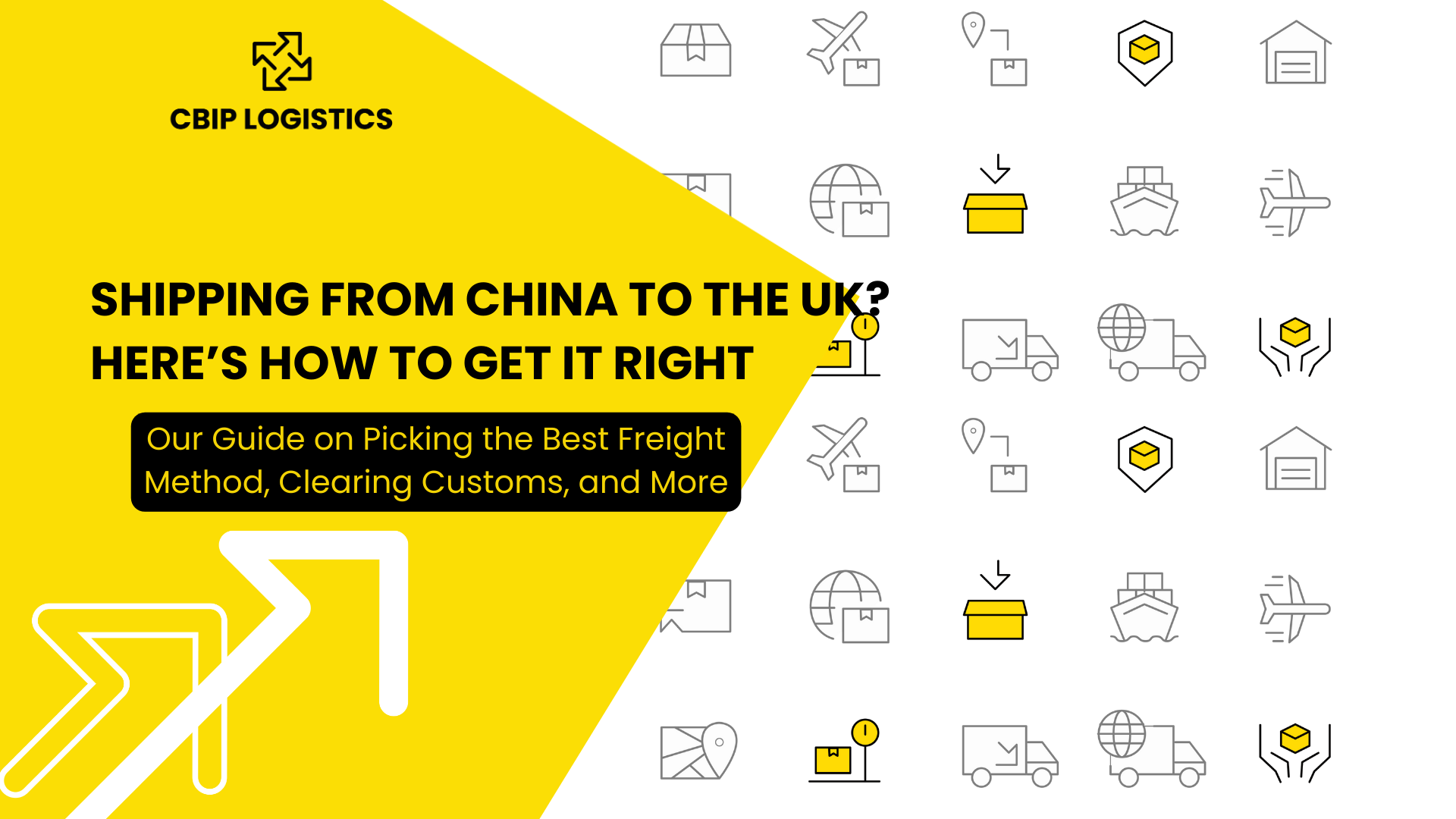Shipping from China to the UK? Here’s How to Get It Right

As the world’s manufacturing powerhouse, China ships a huge amount of goods to the UK. And British consumers, making up the world’s fifth-largest economy, continue to buy more and more Chinese goods each year.
Although manufacturing has begun to spread out in recent years, China is still one of the top places to manufacture a large range of products, from electronics to textiles. For many e-commerce companies, manufacturing in China is a no-brainer.
However, UK laws and import regulations are more complicated and complex than ever post-Brexit. Add in language barriers and seemingly endless shipping options, and knowing how to import products from China to the UK can seem like an impossible task.
While it may seem intimidating, importing successfully from China to the UK is all about properly preparing yourself — and working with the right logistics partner. Read on to get started preparing to ship from China to the UK.
Read About CBIP’s Global 4PL Logistics Services
Ocean Freight: FCL or LCL?
If you’re shipping to the UK, you’re probably sending your goods by sea, along with 95% of all UK import and export tonnage.
When it comes to ocean freight, there are two options: FCL and LCL.
FCL, or Full container load, is meant for high-volume shipments that fill an entire 20 or f40-foot container. Since FCL shipping comes at a flat rate, FCL can save you money if you have enough product to make it worth the money.
With LCL, or Less than container load, you will be sharing the container with someone else.
Which should you choose? To find out if it's worth getting a full container for yourself, you’ll need to first estimate how much space you need.
Keep in mind that LCL is not charged by weight, but the space your product takes up. That means that if you have a product that cannot be stacked to conserve space, ie fragile art or electronics, then you will need to pay more per square foot with LCL to allow them the space they need.
If you are shipping something like s shipment of porcelain statues, for instance, they may require more square footage to ensure that they are not stacked in a way that would damage them.
Additionally, if you are shipping your products with other products in a shared container, there’s an increased possibility that an item from another company’s shipment could damage yours.
Ports & routes
There are dozens of popular ports in the UK and in China.
Some of the most popular port-to-port routes are:
- Shenzhen to London
- Shenzhen to Southampton
- Shanghai to London
While your carrier, port of departure, and port of entry will all affect your shipping speed, you can generally expect sea transport from China to the UK to take between 30 and 40 days.
Crossing the ocean is just one leg of the journey, though. Don’t forget to factor in that first mile, last mile, or the time it takes to get through customs, which could take anywhere from an additional 24 hours to several weeks.
Related: New to terms like ‘VAT’ and ‘de minimis’? Check out our terminology cheat sheet.
Air freight
Although most China-UK freight travels by sea, a small percentage of cargo is shipped by air freight.
Although times can vary, air freight from China to the UK typically takes three to eight days.
When it comes to costs, air freight will get less expensive per pound as the overall weight of the shipment increases. For instance, the chargeable weight for a 10-kilogram shipment is around $65.47, while the cost of shipping a 100-kg load is only $14.31.
If you are really in a hurry, you can opt for express air freight. Typically, this method is reserved for items that need to be shipped quickly due to things like product safety concerns or deadlines, and it comes with a hefty price tag.
Cargo airports in China and the UK
You will likely be shipping your goods out of Shanghai or Shenzhen. The three airports that handle most airfreight cargo are Shanghai Pudong International (PVG), Guangzhou Airport (CAN), and Shenzhen (SZX).
In the UK, East Midlands Airport gets the most cargo traffic, but there’s also Heathrow (LHR) in London, and Edinburgh Airport(EDI) in Scottland.
China & UK trade regulations
Import Taxes
Whether you ship by sea or air, you will still need to pay import taxes and follow customs guidelines for both countries.
Post-Brexit, the UK has implemented new, complicated import tax laws that affect sellers shipping goods into the UK. The rules are different for foreign sellers stocking British shelves versus e-commerce businesses selling directly to British consumers, so make sure you read up on the rules and understand what your situation calls for. (Or you can hire someone to help you, as the official customs website suggests.)
In general, you should be prepared to pay anywhere from 5% to 20% value-added tax (VAT) on Chinese exports, depending on the type of product. The UK has a de minimis threshold of £135, so if you’re shipping a container of goods worth less than that, you won’t have to worry about customs or excise duty.
For tariffs, the UK government has a handy lookup tool for you to calculate potential fees if you want to get an idea of how much you’ll be charged.
Getting through customs
For people importing into the UK, the government lays out an 11-step process to help you along the way. For people sending goods from China specifically, these steps are especially important:
1. Get an EORI number
You’ll need to apply for an Economic Operators Registration and Identification (EORI) number to move goods into the UK. It should start with GB (for goods going to England, Wales, or Scotland) or XI (for goods going to Northern Ireland). You can apply directly on the website.
2. Check if you should register for VAT
If you do a certain amount of business in the UK each year, you need to register for VAT. Check this website to see if this rule applies to you.
3. Check Chinese exportation laws
If you’re working with a Chinese company, they’ll probably need an export license to send goods worldwide. Export regulations can be just as complicated as import laws, so make sure you check with local authorities in China before trying to move products out of the country.
4. Make your goods declaration
This part can be a little difficult and requires high attention to detail, so many businesses that send goods to the UK hire services to help out with the paperwork.
5. Look up the commodity code for your product
Every product has a commodity code in the UK, and you’ll need to find yours to calculate taxes and figure out if you need any special licenses or permissions.
6. Determine the value of your goods
This step can get a little complicated too. Hiring a customs broker who knows all the rules can save you time and money by keeping your goods from being returned to China.
7. Check your product’s labeling
If you’re sending goods to be sold in British stores, you’ll have to follow strict labeling guidelines. Mislabeled goods may be denied entry to the UK.
If you’re stuck on where to start, you can use the UK’s official import/export website to see what specific rules and regulations apply to the product you want to ship.
RELATED: How to Ship From Hong Kong Today - Explained by a Hong Kong company
Who can you look to for help?
Getting through UK customs can be complicated — so complicated that the UK government itself recommends commercial importers hire someone to help with the process. The three options they provide are:
- freight forwarders
- customs agents or brokers
- fast parcel operators
Additionally, those exporting manufactured goods from China are typically recommended to use a Chinese shipping agent to smooth out the process of warehousing, transporting, and exporting.
Working directly with any of these can help you move goods along your supply chain or get through customs. But if you want a fully integrated logistics experience that includes
✅ Order management
✅ Shipment tracking
✅ Access to a global network of logistics partners, and
✅ A personalized shipping plan to meet your business needs
...then a 4th-party logistics (4PL) firm will be your best option.
Cross-border logistics made easy with CBIP
If you want a stress-free, comprehensive logistics plan for getting your products from your Chinese manufacturer to your British buyers, CBIP is ready to help you every step of the way.
We have on-the-ground experts in China and logistics partners across the globe. Keep your supply chain moving in sync from the first to the last mile with an international, adaptable network.
Our full-service logistics can do it all: Looking to find freight forwarders or customs brokers recommended by the UK government? How about shipping agents in China? We have those connections.
We’ll help you make it through customs too, keeping track of all key regulations for you and ensuring you never lose time or money by having your shipment stuck at the border. You can even track the status of your shipments and look at your business trends through our licensed logistics software, giving you insight into the best ways to grow.
If you want to learn more about how we can meet all your logistics needs, send us an email. We’re ready to help you expand into the UK today.
Luckily, CBIP specializes in east-to-west shipping, and we’re here to






